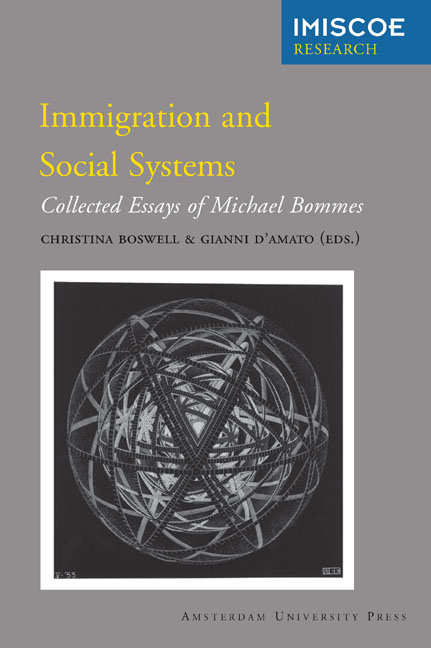Book contents
- Frontmatter
- Contents
- Foreword
- Preface
- Introduction
- 1 Migration in Modern Society
- 2 National Welfare State, Biography and Migration: Labour Migrants, Ethnic Germans and the Re-Ascription Of Welfare State Membership
- 3 Systems Theory and the ‘Ethnic Inequality’ of Migrant Workers
- 4 Welfare Systems and Migrant Minorities: The Cultural Dimension of Social Policies and its Discriminatory Potential
- 5 Transnationalism or Assimilation?
- 6 ‘Integration takes Place Locally’: On the Restructuring of Local Integration Policy
- 7 Illegal Migration in Modern Society: Consequences and Problems of National European Migration Policies
- 8 General and Specific Characteristics of Networks: (with Veronika Tacke)
- 9 National Paradigms of Migration Research: (with Dietrich Thränhardt)
- References
- Other IMISCOE Titles
8 - General and Specific Characteristics of Networks: (with Veronika Tacke)
Published online by Cambridge University Press: 09 January 2021
- Frontmatter
- Contents
- Foreword
- Preface
- Introduction
- 1 Migration in Modern Society
- 2 National Welfare State, Biography and Migration: Labour Migrants, Ethnic Germans and the Re-Ascription Of Welfare State Membership
- 3 Systems Theory and the ‘Ethnic Inequality’ of Migrant Workers
- 4 Welfare Systems and Migrant Minorities: The Cultural Dimension of Social Policies and its Discriminatory Potential
- 5 Transnationalism or Assimilation?
- 6 ‘Integration takes Place Locally’: On the Restructuring of Local Integration Policy
- 7 Illegal Migration in Modern Society: Consequences and Problems of National European Migration Policies
- 8 General and Specific Characteristics of Networks: (with Veronika Tacke)
- 9 National Paradigms of Migration Research: (with Dietrich Thränhardt)
- References
- Other IMISCOE Titles
Summary
Introduction
Networks are everywhere. They operate in all areas of society. They range from local community networks, business development networks, scientific and health networks, women's networks and anti-discrimination networks to those associated with problems in society, such as trafficking and criminal drugs procurement. It is evident from such a list that two kinds of network exist. The first type has a positive connotation and is deemed in political, economic, legal and scientific terms to be a force for good. In other words, their development does not just simply occur, but is proactively regarded as a goal in itself. The second type of network has a negative association, which is why the aim is to prevent or destroy them. However, regardless of whether they are assessed as positive or negative, or whether they are scientific or trafficking networks, there is generally no question about whether they are indeed networks. Yet what do business development networks and criminal procurement networks have in common? Labelling them is of no help either; this merely conceals their considerable ambiguities. Any reference to what generally constitutes a network, and whether their characteristics can be generalised, is therefore avoided.
Furthermore, not all networks actually call themselves networks. Conversely, not every grouping that describes itself as a network falls into the definition of a network in sociological terms, at least not when one assumes that it is scientifically possible to capture the concept in greater detail and to define what can be deemed as a network, and what cannot. From a sociological perspective, a differentiation must therefore be made between a ‘network’ as a social structure within society and a ‘network as defined in everyday language by society, which is a looser interpretation. One reason for this differentiation is that the present-day shifting use of the term ‘network’ creates social complexity. Seemingly arbitrary social relationships are labelled as ‘networks’, and it has therefore become a catch-all concept: whereas in the past workgroups, roundtables or associations were established, nowadays ‘networks’ are created. The social sciences take some responsibility for this semantic diffusion.
- Type
- Chapter
- Information
- Immigration and Social SystemsCollected Essays of Michael Bommes, pp. 177 - 200Publisher: Amsterdam University PressPrint publication year: 2013
- 1
- Cited by



